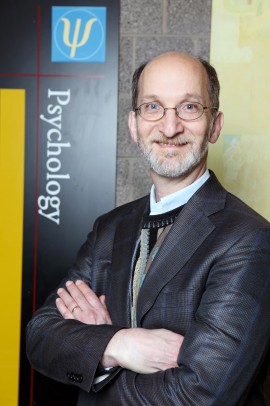UIC scholar advises Congress on legislation for student success

“Social and emotional learning programming improve students’ behavior and academic performance,” says Roger Weissberg. Photo Jenny Fontaine
A UIC researcher is aiding the latest Congressional effort to help preschool through high school students reach their academic and social potential.
Roger Weissberg, NoVo Foundation endowed chair in social and emotional learning, and his colleagues at the Collaborative for Academic, Social, and Emotional Learning, known as CASEL, are scientific advisers to U.S. Rep. Tim Ryan, D-Ohio, and his staff, who have crafted legislation in support of social and emotional learning programs.
“Decades of research show that well-implemented social and emotional learning programming improves students’ behavior and academic performance,” said Weissberg, UIC distinguished professor of psychology and education.
“Recent national polls indicate that educators and parents believe that social and emotional learning should be an educational priority.”
Since 2009, the movement has gained traction with national policymakers. On Feb. 10, Rep. Ryan introduced the Academic, Social and Emotional Learning Act of 2015. Co-sponsors of the bill are U.S. Reps. Susan Davis, D-Calif., Dave Loebsack, D-Iowa, Matt Cartwright, D-Pa., John Yarmuth, D-Ky., and Charles Rangel, D-N.Y., and Aaron Schock, R-Ill.
“I have seen firsthand what teaching social and emotional learning can do for students and their classrooms in Ohio and across the nation,” Ryan said in a statement.
“These programs are scientifically proven to help students increase skills in problem-solving, conflict resolution, responsible decision-making and relationship building — these are the skills that will build the foundation for students to better perform academically and throughout their lives.”
The definitions of social and emotional learning and related programming outlined in the bill are derived from work that Weissberg, CASEL board vice chair and chief knowledge officer, has done in Illinois.
“On a local level, Chicago Public Schools is doing an amazing job supporting this type of programming across the district,” he said.
More funding, support for teacher training
The legislation, HR 850, would make funding available for more schools to employ evidence-based social and emotional learning programs, in addition to supporting teacher training.
“It could be an allowable expense to use federal funding for professional development for teachers and administrators to implement evidence-based programs with quality,” Weissberg said. “It is important that this bill also recommends inclusion of social and emotional learning in the No Child Left Behind Act reauthorization.”
It is critical to make professional development available for administrators and teachers so they provide “the most beneficial programming for students,” Weissberg said.
A 2013 study found teachers overwhelmingly advocate for SEL implementation and believe it will improve students’ academic performance and college, career and life readiness. “It will also improve school climate and discipline approaches, but teachers want backing from their superintendents, boards of education, principals and colleagues to support their efforts,” he said.
A similar bill was introduced two years ago in the House of Representatives, but it failed to receive enough support to proceed to the Senate. Weissberg hopes Schock’s involvement as a bill co-sponsor will encourage broader bipartisan support.
The Academic, Social, and Emotional Learning Act was referred to the House Committee on Education and the Workforce, which will consider the resolution’s merit for general debate in the House.
For more information about the bill, contact Weissberg at rweissberg@casel.org
